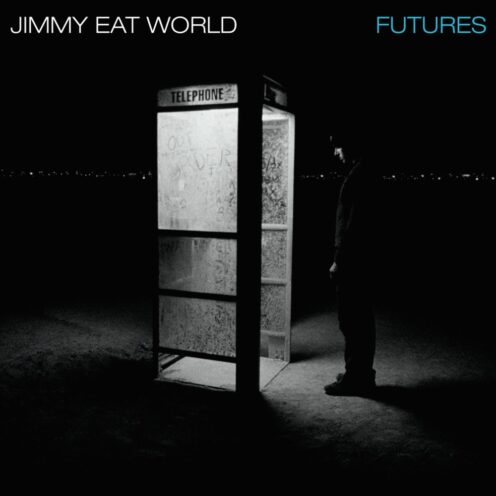
Sometimes on those cold late nights when the air coming from my body feels as if my soul is struggling to unleash itself from its shackles, I think of the words sung by Jimmy Eat World front man Jim Adkins on “Night Drive”: “You pierce my heart like a willing arm, your ticking makes my blood move.” Lines such as this, that sting immediately due to their poignancy and stark honesty fill the entire landscape that Jimmy Eat World’s landmark 2004 album Futures builds for itself and the listener.
Not too many albums in recent memory have the power Futures manages to contain. That is, providing a rich, layered texture over a vast atmosphere, blending pop music with the raw, dark moodiness of alternative bands such as Heatmiser and Sunny Day Real Estate. Stepping away from their mainstream breakthrough, 2001’s Bleed American (later re-released as a self-titled disc) and its sunshine-pop melodies, Jimmy Eat World take a cue from that album’s finale “My Sundown” and continues down a darker road full of the best material they have released.
Kicking off with the rollicking political-themed title track, bass player Rick Burch and guitarist Tom Linton provide the thunder to Jim Adkins’ lightning, adding multiple rhythms over Zach Lind’s percussion rain shower. “Just Tonight…” is fast-paced and driven by breakneck guitars as Adkins shifts his vocal style from embittered to intrigued, singing about the ability some mysterious woman holds over him. “Work” is a fairly simple, stripped down, slow-tempo song Jimmy Eat World are best at, and it works well as a ballad.
Perhaps one of Futures’ and Jimmy Eat World’s best songs is “Kill,” a song that mixes a deep bass line, swirling drumbeats, and an acoustic guitar with a hook so intoxicating, you’d swear that you were barely able to walk. The song catches the listener off-guard with how wonderfully hypnotic it is, as Adkins’ yearning becomes the voice of every listener. While one of the darker, angrier tracks (“Pain”) was not the album’s best option for a lead single, haunting epics like “Drugs or Me” legitimately prove this album is a far cry from the mainstream radio anthems that fill Bleed American. The bass line that runs deep and plunges through the veins of “Polaris” sticks with you long after it’s over, and Adkins’ voice has never sounded so commanding. You’d swear he’s aiming for his vocals to reach the star he named the song after.
It isn’t strictly Jim Adkins’ show here, though. While his songwriting and vocal strength improved greatly on Futures and left him as an immaculate force in many fans’ eyes, the rest of the band goes head over heels in order to exemplify their talents. Burch’s bass gives the album a sinister undertone, weaving in and out of songs and assisting in the creation of a lavish atmosphere. Zach Lind sets off sparks with percussion crashing around each turn, illustrating the rich layer of sound on every song. Tom Linton (who really needs to get another song like “Blister” on the next Jimmy Eat World LP) is the ying to Jim Adkins’ yang when it comes to guitar: the two go in different directions of each song, distancing from the usual rhythm guitar parts, which gives the album it’s soul.
As the album ends with the lustful “Night Drive,” a song in which you can practically feel the car windows fog up and the almighty “23,” an epic coming-of-age diary entry anthem that reigns over all other Jimmy Eat World songs with its delicacy and vivid imagination, Futures never feels like it outstays its welcome nor does it appear too short. A diamond in the rough, Futures will forever stick out over the consensus of your average major-label cocktails because it isn’t like many other albums. Producer Gil Norton, who produced the Foo Fighters’ landmark 1997 album The Colour and the Shape, again displays why he is such a talent: he gives bands the tools they need to create a diverse sound on one album without straying from their initial ideas.
For anyone who is looking to discover the album that has yet to speak to them when all they are looking for is a way to be set free and discover the words they can’t seem to find themselves, Futures is that open window.
“Don’t give away the end,“ sings Adkins on the album closer. “The one thing that stays mine.” As much as we all share Futures and how it has remained such a prevailing album for each of us, we still all feel like it’s our own personal exit from the world, and that it is ours to keep.